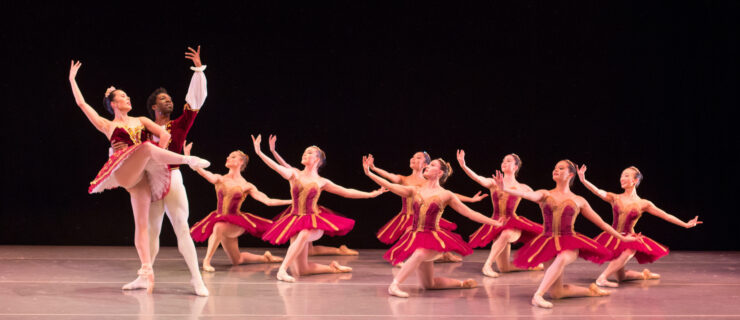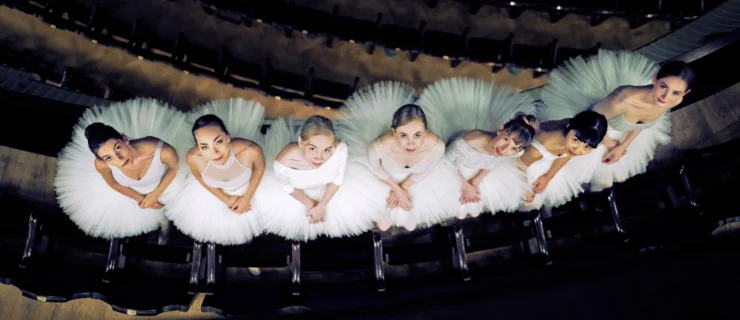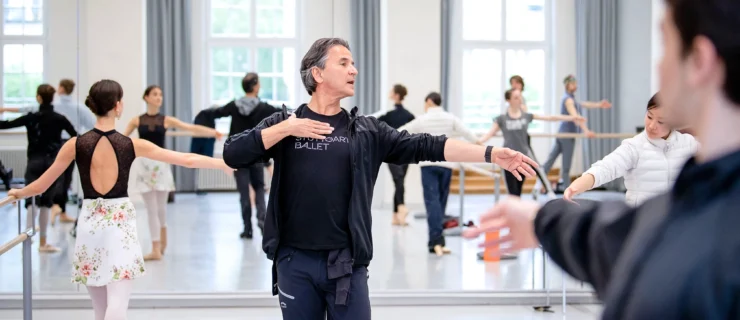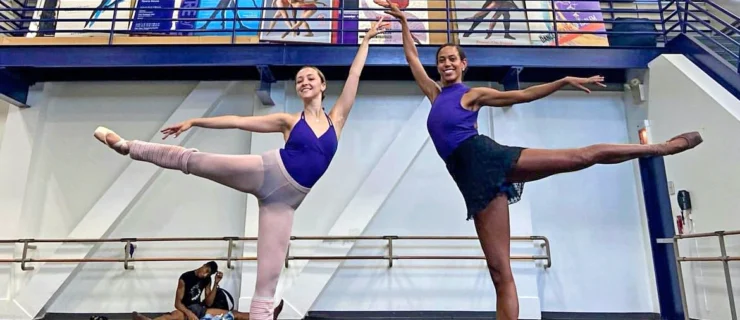Last Summer
After a long performance season or a grueling tour, most professional dancers look forward to slowing down and relaxing, but a few anticipate refreshing or inspiring opportunities.
A Role to Grow In
When 24-year-old New York City Ballet principal Ashley Bouder was offered the chance to perform the title role in Giselle under the tutelage of one of the all-time great Giselles, Carla Fracci, she didn’t hesitate to give up her time off.
Bouder prepared for the role by studying videos of the ballet, but deliberately did not teach herself the famous mad scene, preferring to learn it from Fracci herself. “She is legendary,” says Bouder. “You can still see her being Giselle when she’s telling you what she wants.” Fracci was a generous coach, encouraging Bouder to find her own interpretation and even changing some of the choreography to show off Bouder’s NYCB speed.
Bouder relished the chance to work with her and to perform at the Teatro dell’Opera in Rome. Despite having danced The Sleeping Beauty and Swan Lake with NYCB, she welcomed the challenge of a full-length dramatic ballet.
“It’s still hard to adjust to a full-length because we don’t do them often at NYCB. We’re used to 20-minute ballets,” she says, adding that she found creating “the depth of character to be something new and exhausting. It’s a completely different approach to being an artist and thinking about dancing.”
In The Studio Again
Ballet San Jose’s Preston W. Dugger III also traded his summer break for the chance to expand his professional horizons. The former Dance Theatre of Harlem dancer had just finished BSJ’s five-week tour of China when the opportunity came to teach at the Usdan Center for the Creative and Performing Arts on Long Island, NY.
Dugger, 28, has no formal training as a dance instructor, but he’s been teaching since he was 16, first for a community outreach program where he began his dance training, and more recently for BSJ’s school. The Usdan schedule was more strenuous than any teaching he’d done in the past, though, requiring him to give several classes a day, five days a week, to children of many different ages.
As if that wasn’t enough, he also performed while he was there. “It sounded crazy for me to do all that right after the China tour, but I had a great time,” says Dugger. “I was teaching, taking class and performing.” He hopes to have his own school someday. “It’s so fun to see a child grasp what they’re going for and blossom,” he says. “That’s really cool.”
Calling The Shots
Twenty-year-old Nicholas Coppula, a Pittsburgh Ballet Theatre corps de ballet member, may have spent his summer offstage but he was still in the theater—working backstage. He got to try his hand at being both stage manager and lighting designer for PBT’s school performances and for The Dancers’ Trust Fund, a Pittsburgh organization that helps dancers transition to other careers.
Just as happy behind the scenes as onstage, Coppula learned stage management and lighting by watching others and volunteering at several theaters in the Pittsburgh area. He has worked at union theaters, including the Byham Theater and the Benedum Center for the Performing Arts, even though he is not a member of the union yet. He is on the overhire list for the local IATSE (the union of professional stagehands and technicians), which means that when extra help is needed he gets called in to work.
Coppula says that last summer his biggest challenge as stage manager was “organizing everything so that when I was in the theater no time got wasted.” He spent many hours preparing before walking into the theater, going over the details of lighting cues and crew instructions so that he was efficient on the job. “It can involve long hours sometimes, so you need to be committed to the work,” he advises dancers who are interested in learning backstage technical work. “Hopefully this means that you enjoy it. Finding smaller
theaters in your city can be a good way to gain some experience. They are almost always looking for volunteers.”
Thinking ahead, Coppula already has his plans made. “When I retire from dancing professionally I will continue working in the theater world, possibly as a stage manager, but definitely on the technical side,” he says.
Managing More
For Anne Mueller, a 33-year-old principal dancer with Oregon Ballet Theatre, both arts management and choreography have kept her recent summers busy. She spent her downtime last summer choreographing and producing a new ballet for the Sweet Pea Festival of the Arts in Bozeman, MT, bringing together five OBT dancers, including herself. “This was a perfect chance to work with great dancers and make the piece I wanted to make,” says Mueller. “It was a delightful experience.”
Mueller has done similar work in the past. A founding member of the Trey McIntyre Project, she danced with the company and was managing director for TMP during the summers of 2004 and 2006. Last summer, too, while at the Sweet Pea Festival, she continued her connection with McIntyre by acting as director of outreach for his company, a job that included choosing instructors to teach workshops, negotiating their salaries and organizing the workshop schedules.
A classic role, or the chance to teach, choreograph, direct or stage-manage are all terrific reasons for a dancer to keep working during a company break. But doesn’t a dancer need time off to recover from the stress and hard work of the regular season?
“Only you can be the judge of when you need a break, and you should absolutely listen to yourself if that’s what you feel,” says Mueller. “For me, if I come across something that interests me and may further my career goals, plus be good for me artistically and intellectually, I know I’ll figure out how to cope with the additional pressure the project requires.”
And for Ashley Bouder, it wasn’t just the opportunity to work with a legendary ballerina that made her work through her time off: She always prefers to keep dancing.
“I’ve found that it’s better for my body to just stay in shape,” says Bouder. “Besides, I love dancing so much that I love all of the opportunities and try to take advantage of every single one.”
Choreographer and former dancer Leda Meredith is the author of Botany, Ballet and Dinner from Scratch which has just been published.





